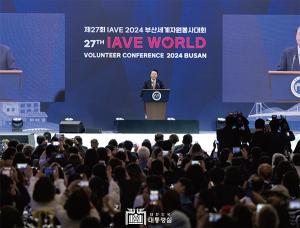 |
||
| ▲ Geumjeongsanseong Makulli / Chungkil Yu | ||
The scent of yeast spreads as I watch the white and thick color of makulli, Korean rice wine. It is meaningful that this Geumjeongsanseung Makulli is melted with a 500 year old tradition of making Korean rice wine. Some of those who tasted it gave their testimony that they wanted to return back to the pub just to have one more bowl since it was too good to have a couple of bowls only.
Jokta Method, the 500 year old tradition, is made by the maker treading on the yeast wrapped with a cloth and it is the one and only kind of Korean rice wine according to Chungkil Yu, the first officially approved Korean makulli master and CEO of Geumjeongsanseong Makulli, who has passed down the 500 year old tradition for 15 generations.
He made Geumjeongsanseung Makulli as a proper noun and a pride of Busan Metropolitan City and says it is his calling to pass down the method to his junior generation.
Among many makulli in South Korea, Geumjeongsanseong Makulli is the one and only officially recognized traditional folk liquor. Back in Joseon dynasty, the liquor quenched the thirst of builders of Geumjeong Castle. Unlike other makulli which altered the yeast with wheat flour, Geumjeongsanseong Makulli has kept its traditional way of using yeast alongside rock water 250 meters above sea level in the region.
“I was born and bred in Geumjeongsanseong Village. I grew up watching villagers making makulli with yeast so it was natural for me to learn the method. It takes a considerable amount of time and effort but keeping this unique tradition and passing it down just made the work exciting rather than one of many unwilling labors.”
Yu is determined to pass down the tradition, prove its value scientifically and spread its excellence to the world over Korea. A story goes that the deceased former president Chunghee Park happened to pass by the village and tasted the makulli and was instantly enchanted and allowed the making it legal which then was illegal; it was 1976 and the president issued a license for Geumjeongsanseong Makulli and it became the first officially approved traditional folk liquor.
Dietary fiber in the yeast is known to be good for bowl movement and digestion. Yeast is made from ground whole wheat. People use their hands to make it into a paste by adding water time to time and divide it into each 1kg slice to make yeast.
“We do not even use the frame for yeast but only the cloth so that the dough is not messed up. And this process requires highly skilled men which we proudly have.”
It is important to tread the yeast neat and thorough so that the air has no chance to be within. When ready, the yeast goes to fermentation cellars to be fermented for more than 15 days in the temperature around 40℃ and the humidity around 80%.
“The yeast is 31cm to 33cm in diameter, 1cm thick in the center, 2cm thick on the rim and it weighs around 900g to 1kg. It has unique shape and unique fruity flavor.”
If you want to see this 500 year old tradition, you can do so by visiting Geumjeong Village especially during the Geumjeongsanseong Makulli Festival. It was held on 10th August this year and many visitors willingly joined the makulli making from A to Z. The festival marked 11th year and it has grown as one of the hottest regional festivals in Busan and around.
천서영 기자 yesyounglife@naver.com







